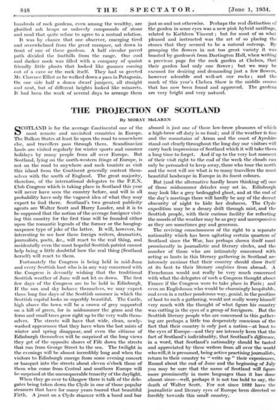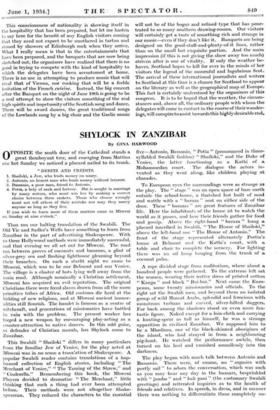THE PROJECTION OF SCOTLAND
By MORAY McLAREN
SCOTLAND is for the average Continental one of the most remote and unvisited countries in Europe. The Balkan States at least lie upon the road to somewhere else, and travellers pass through them. Scandinavian' lands are visited regularly for, winter sports and sumther holidays by many people from all over Europe. But Scotland, lying on the north-western fringe of Europe, is not on the road to anywhere and such tourists as visit this island from the Continent generally content them- selves with the south of England. The great majority, therefore, of the international delegates to the P.E.N. Club Congress which is taking place in Scotland this year will never have seen the country before, and will in all probability have only the vaguest idea of what they may expect to find there. Scotland's two greatest publicity agents are Walter Scott and Harry Lauder, and it is to be supposed that the notion of the average foreigner visit- ing this country for the first time will be founded either upon the romantic legends of the former or the banging- saxpence type of joke of the latter. It will, however, be interesting to see how these foreign writers, dramatists, journalists, poets, &c., will react to the real thing, and incidentally even the most hopeful Scottish patriot cannot help being a little doubtful how the real thing (Scotland herself) will react to them.
Fortunately the Congress is being held in mid-June and every Scottish host who is in any way concerned with the Congress is devoutly wishing that the traditional Scottish weather of June will not let us down. The first few days of the Congress are to be held in Edinburgh. If the sun and sky behave themselves, we may expect those long fine days of the Scottish summer in which the Scottish capital looks so superbly beautiful. The Castle, high above the town will be a crown of grey supported on a hill of green, for in midsummer the grass -and the ferns and small trees grow right up to the very walls them- selves. The streets will have that wide, clean, newly- washed appearance that they have when the last mists of winter and spring disappear, and even the citizens of Edinburgh themselves will be surprised at the long views they get of the opposite shores of Fife down the streets that run from George Street 'to the sea. The twilight in the evenings will be almost incredibly long and when the visitors to Edinburgh emerge from some evening concert or banquet into the streets about eleven o'clock those of them who come from Central and southern Europe will be surprised at the unconquerable tenacity of the daylight.
When they go over to Glasgow there is talk of the dele- gates being taken down the Clyde in one of those popular steamers that have for many years toured that beautiful Firth. A jaunt on a Clyde steamer with a band and bar aboard is just one of those low-brow pleasures of which a high-brow off duty is so fond ; and if the weather is fine and the mountains of Arran and the coast of Ayrshire stand out clearly throughout the long day our visitors will carry back impressions of Scotland which it will take them a long time to forget. And if up to the very last moment of their visit right to the end of the week the clouds can only be persuaded to keep away, those who tour the north and the west will see what is to many travellers the most beautiful landscape in Europe in its finest colours.
But (and the alternative hardly bears thinking of)_ one of those midsummer drizzles may set in. Edinburgh may look like a grey bedraggled ghost, and at the end of the day's meetings there will hardly be any of the decent obscurity of night to hide her drabness. The Clyde expedition may be a dreary drift through mist, and the Scottish people, with their curious facility for reflecting the moods of the weather may be as grey and unresponsive as they are sometimes gay and generous.
The reviving consciousness of the right to a separate nationality which has been agitating certain quarters of Scotland since the War, has perhaps shown itself most prominently in journalistic and literary circles, and the number of those who are intimately concerned with acting as hosts in this literary gathering in Scotland are intensely anxious that their country should show itself at its best to their literary confreres from abroad.. Frenchman Frenchman would not really be very much concerned with what the delegates of such a Congress thought about France if the Congress were to take place in Paris ; and even an Englishman who would be charmingly hospitable, and even in a rather ponderous way, genial, in the position of host to such a. gathering, would not really worry himself very much with the thought of what figure his country was cutting in the eyes of a group of foreigners. But the Scottish literary people who are concerned in this gather- ing are perhaps a little too desperately conscious of the fact that their country is only just a nation—at least to the eyes of Europe—and they are intensely keen that the fact of Scotland's individuality, that Scotland's difference, in a word, that Scotland's nationality should be tasted and appreciated by these writers from all over the world who will,it is presumed, being active practising journalists, return to their country to " write up " their experiences. Round about the end of June and the beginning of July you may be sure that the name of Scotland will figure more prominently in more languages than it has done almost since—well, perhaps it is not too bold to say, the death of Walter Scott. For not since 1832 have the journalistic and literary eyes of Europe been directed so forcibly towards this small country. This consciousness of nationality is showing itself in the hospitality that has been prepared, but let me hasten to say here for the benefit of any English visitors coming that they need not expect to be smothered in tartan and stoned by showers of Edinburgh rock when they arrive. What I really mean is that in the entertainments that have been prepared, and the banquets that are now being sketched out, the organizers have realized that there is no good in trying to compete with the kind of hospitality to which the delegates have been accustomed at home. There is no use in attempting to produce music that will rival that of Vienna, nor cooking that will be a feeble imitation of the French cuisine. Instead, the big concert after the Banquet on the night of June 19th is going to be a real attempt to show the visitors something of the real high spirits and impetuosity of the Scottish song and dance. There will be sword dances, the great traditional songs of the Lowlands sung by a big choir and the Gaelic music will not be of the bogus and refined type that has pene- trated to so many southern drawing-rooms. Our visitors will certainly get a taste of something rich and strange in our music—even if they don't like it. Banquets are being designed on the good-stuff-and-plenty-of-it lines, rather than on the small but exquisite portion. And the main impression (if this is not giving the show away too much) striven after is one of vitality. If only the weather be- haves, Scotland hopes to kill for ever in the minds of her visitors the legend of the mournful and lugubrious Scot: The arrival of these international journalists and writers to Scotland at this time is a chance for Scotland to appear On the literary as well as the geographical map of Europe: This fact is certainly understood by the organizers of this congress. It is to be hoped that the weather, the circum- stances and, above all, the ordinary people with whom the delegates will come in contact in the course of their wander- ings, will conspire to assist towards this highly desirable end,





































 Previous page
Previous page